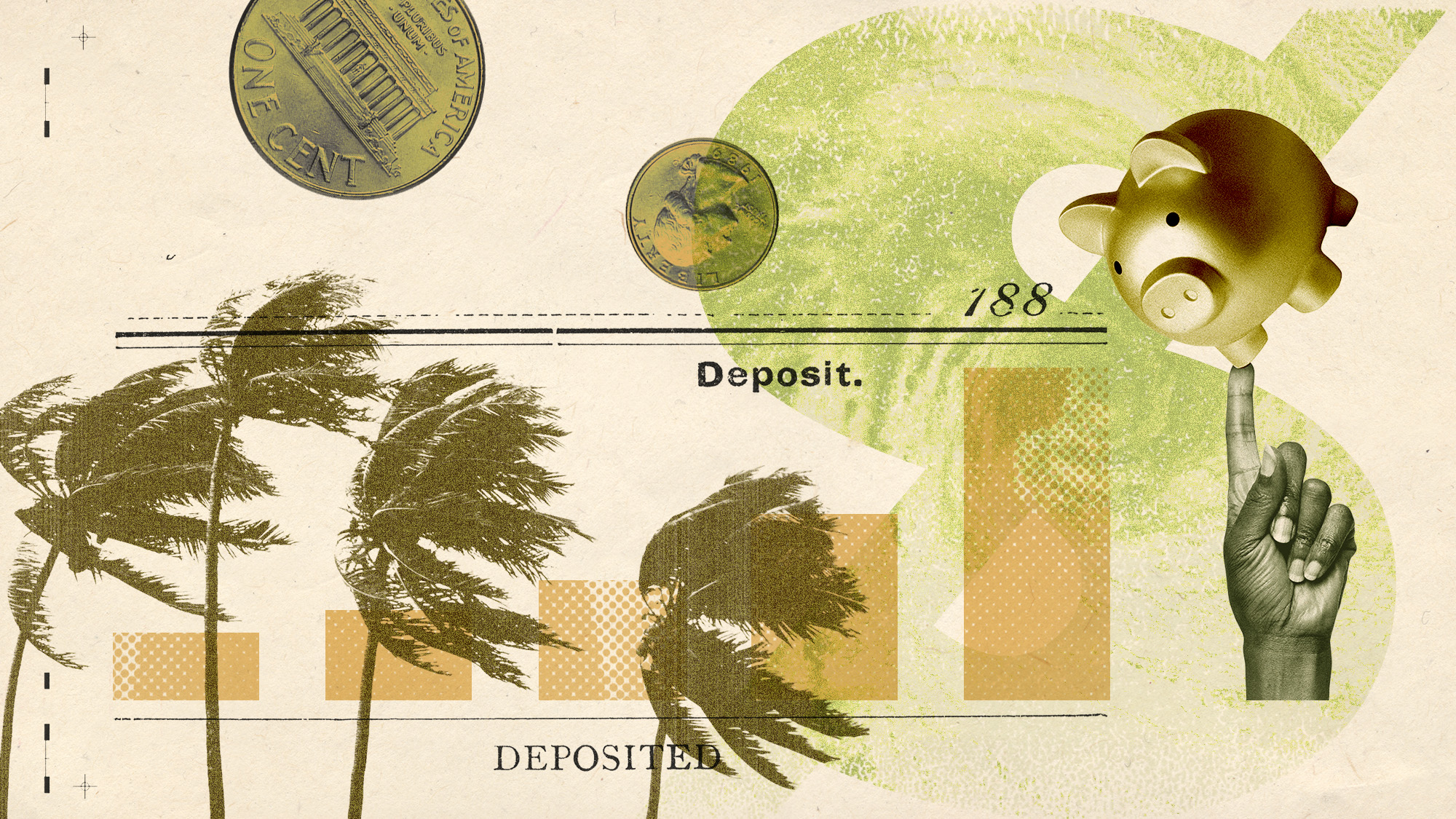Why BP is cutting back on its climate goals
The oil giant's decision won't help the fight against climate change


A free daily email with the biggest news stories of the day – and the best features from TheWeek.com
You are now subscribed
Your newsletter sign-up was successful
The road to a carbon-free world just got a little bumpier. BP — the energy company that pledged in 2020 to slash its carbon emissions to net zero — this week announced that its transition to renewable energy will slow down. Instead, The Wall Street Journal reports, the company is going to increase its spending on oil and gas after earning nearly $28 billion in profit for 2022. "At the end of the day, we're responding to what society wants," said Bernard Looney, the company's CEO. Critics say the decision will make it more difficult for the world to slow the rate of climate change. "Just when we need to be rolling back oil & gas production @BP_plc is rolling back its climate commitments," tweeted Doug Parr, the chief scientist for Greenpeace UK. Why is BP backing off its climate commitments? Here's everything you need to know:
What were BP's climate goals?
Even though it's a giant oil and gas company, BP has long tried to present an environmentally friendly image to the public: It even changed its name from "British Petroleum" in 2000 to de-emphasize the whole oil thing — the BP supposedly stood for "beyond petroleum" — and even helped popularize the idea of a "carbon footprint" in an early 21st-century advertising campaign. (Critics said the concept tried to shift the blame for climate change from big oil companies like, well, BP to individual consumers.) And in 2020, the company declared it would slash the carbon content of its products in half by 2050, largely by shifting to renewable energy products. There was skepticism, The Washington Post noted at the time. "It means BP is fundamentally promising to become a completely different kind of energy company by 2050," said Columbia University's Jason Bordoff. "Now we need its actions to live up to its promises."
So what changed?
BBC News reports that BP was aiming for at least a 35 percent carbon reduction by the end of this decade �� that goal is now targeting a cut of somewhere between 20 and 30 percent. Why? "The shift follows a tumultuous year in energy markets driven by Russia's war in Ukraine that supercharged the industry's profits and drove up costs for households," the Financial Times reports. Looney says the moment calls for his company to drill and deliver more oil and gas to the market right now: "Governments and societies around the world are asking companies like ours to invest in today's energy system," he said. But FT also suggests that BP's climate goals have — despite the big profits that remain — undermined the company's value with shareholders. "Total shareholder returns since Looney took the helm in February 2020 have been the lowest among" major oil companies. And none of those companies have set a hard target to reduce carbon emissions. That means there's pressure to produce bigger returns, and also to back away from measures — like climate goals — that get in the way.
The Week
Escape your echo chamber. Get the facts behind the news, plus analysis from multiple perspectives.

Sign up for The Week's Free Newsletters
From our morning news briefing to a weekly Good News Newsletter, get the best of The Week delivered directly to your inbox.
From our morning news briefing to a weekly Good News Newsletter, get the best of The Week delivered directly to your inbox.
How are those other energy companies doing?
Exceedingly well, financially. Shell made $39 billion in profits in 2022 — the highest in its 115-year history, and more than double the previous year's returns. Chevron made $36 biExxon did even better: $56 billion in profits, which Reuters calls "a historic high for the Western oil industry."
What are critics saying?
BP's decision to cut back on its climate commitments — and the oil industry's mind-bending profits — have naturally produced pushback from climate activists. "It's astounding that in the middle of a climate emergency BP is planning to invest billions more dollars on planet-warming fossil fuels than on clean, green renewables." Friends of the Earth's Mike Childs tells The Guardian. In the UK, at least, there has been growing talk of putting teeth into a windfall tax on oil companies' global profits. There are big obstacles: Jeremy Hunt, the government's treasury minister, said this week he won't raise the tax. "Anything higher will stop investment, increase dependence on Putin and increase energy prices," he said. In the United States, California is also considering a windfall tax on oil companies. But while the Biden Administration has criticized the big oil profits, it's not clear that any federal action is forthcoming.
What's next?
More warming, and more drilling. The two are related. On Tuesday, the United Nations released a report — "Bracing for Superbugs" — saying global warming is contributing to the rise of bacteria, viruses, and fungi that can defeat medications that neutralize them: As many as 10 million people a year are expected to die from such infections by 2050. In the meantime, though, Bloomberg reports that BP's strategy involves "adding drilling capacity in the Gulf of Mexico, the North Sea and the Permian shale formation in the U.S." But at least one expert says that what goes up must come down. "This is a temporary situation," former BP executive Nick Butler tells BBC. "Oil and gas prices are going down and the windfall these companies are making won't last."
A free daily email with the biggest news stories of the day – and the best features from TheWeek.com
Joel Mathis is a writer with 30 years of newspaper and online journalism experience. His work also regularly appears in National Geographic and The Kansas City Star. His awards include best online commentary at the Online News Association and (twice) at the City and Regional Magazine Association.
-
 Political cartoons for February 16
Political cartoons for February 16Cartoons Monday’s political cartoons include President's Day, a valentine from the Epstein files, and more
-
 Regent Hong Kong: a tranquil haven with a prime waterfront spot
Regent Hong Kong: a tranquil haven with a prime waterfront spotThe Week Recommends The trendy hotel recently underwent an extensive two-year revamp
-
 The problem with diagnosing profound autism
The problem with diagnosing profound autismThe Explainer Experts are reconsidering the idea of autism as a spectrum, which could impact diagnoses and policy making for the condition
-
 Why the catastrophe bond market is growing
Why the catastrophe bond market is growingThe Explainer The bonds pay for climate change disaster damages
-
 Why are home insurance prices going up?
Why are home insurance prices going up?Today's Big Question Climate-driven weather events are raising insurers' costs
-
 Christmas trees: losing their magic?
Christmas trees: losing their magic?In the Spotlight Festive firs are a yuletide staple but are their days numbered?
-
 The ocean's blue economy is growing. Can the tide continue to rise?
The ocean's blue economy is growing. Can the tide continue to rise?The Explainer The big blue is bringing in the green
-
 The rise of the world's first trillionaire
The rise of the world's first trillionairein depth When will it happen, and who will it be?
-
 The surge in child labor
The surge in child laborThe Explainer A growing number of companies in the U.S. are illegally hiring children — and putting them to work in dangerous jobs.
-
 Your new car may be a 'privacy nightmare on wheels'
Your new car may be a 'privacy nightmare on wheels'Speed Read New cars come with helpful bells and whistles, but also cameras, microphones and sensors that are reporting on everything you do
-
 Empty office buildings are blank slates to improve cities
Empty office buildings are blank slates to improve citiesSpeed Read The pandemic kept people home and now city buildings are vacant
